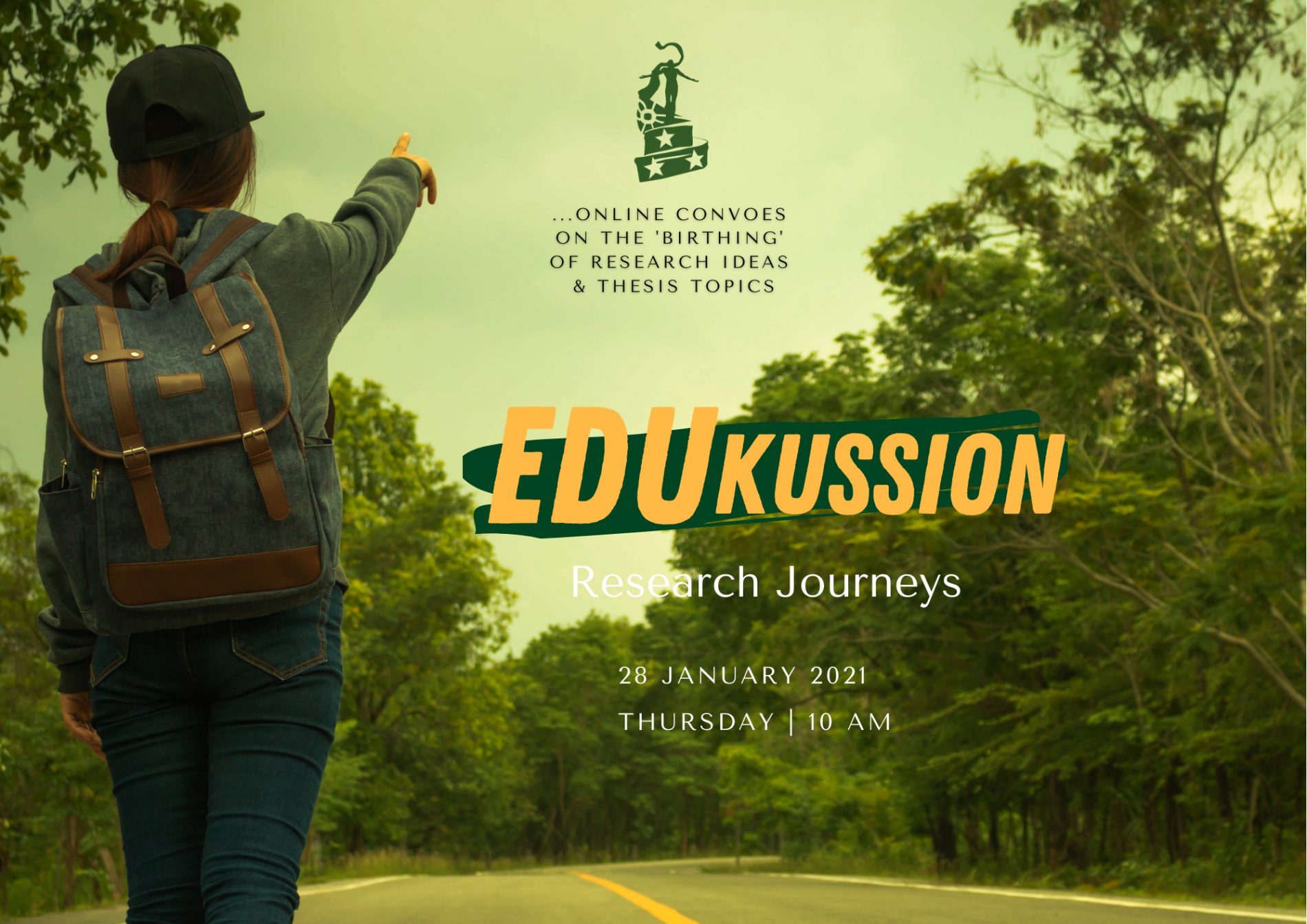The University of the Philippines Open University (UPOU) Faculty of Education (FEd) conducted the 10th EDUkussion Forum on Research Journeys last 28 January 2021 via Zoom. With the topic, “Online Convoes on the Birth of Research (Part I),” the webinar invited FEd students and program chairs from the Graduate Certificate/Master of Distance Education (GC/MDE), Diploma/Master of Arts in Literacy and Language Education (D/MLLE), and Diploma/Master of Arts in Social Studies Education (D/MSSE) programs as well as graduate students from other UPOU programs and tertiary level institutions.
Research Journeys was designed to complement ongoing formal course activities related to research and special problems in FEd’s MA programs. To kick off the series, three guest speakers from FEd were invited to share their reflections and personal experiences in conducting research for their thesis or dissertation. Therese Marie Quilnat, a research assistant under the Bachelor of Education Studies (BES) program of FEd and MS Environmental Science student at the University of the Philippines Los Banos (UPLB), shared the thought process and inspiration behind the evolution of her thesis topic in a talk entitled, “Getting Started.” What initially began as a passion for the topic of ‘ecotourism’ eventually led to a thesis proposal on ‘disability-inclusive disaster risk and reduction management’ (DRRM) after much reflection, research, and consultation with her adviser. Although the list of topics she shared with the audience may seem unrelated at first, Quilnat elaborated that the research journey is often riddled with failures but it is perseverance that will help in getting through each phase. To narrow down her choices, one of the techniques that Quilnat shared was to keep a journal to jot down random ideas. Also, she reminded the participants to always be in constant communication with their advisers for guidance.
Asst. Prof. J. Aleta Villanueva, the program chair of the Diploma/Master of Arts in Social Studies Education program, shared her personal reflections as both a Ph.D. student and faculty member through a storytelling of her decade-long Ph.D. journey that began in 2004 at UP Diliman. Dr. Villanueva shared that blogging became an effective way for her to make sense of her life experiences as both an educator in her own progressive school and eventually in higher education. “Research ideas are part of who we are,” Dr. Villanueva emphasized. In addition to blogging, conducting her own experiments, mini-studies, and mock presentations were all part of her process for developing and refining a research topic idea. Though her initial proposal on social studies curriculum development in progressive schools was rejected by her panel she tried to work on other topics that panel members advised looking into. Working at UPOU and exploring the university’s Community Site eventually led her to develop an interest in the topic of ‘virtual community building.’ Together with some colleagues in UPOU, she has published many papers on the subject matter. But after getting rejected once again for her next research proposal on a framework for e-readiness for e-learning at the K-12, she decided to leave the program with a heavy heart but with many lessons learned such as “experience is the best teacher and your source of wealth.” Dr. Villanueva informed the audience that she will share the second half of her Ph.D. journey in another session.
Building on the momentum of Quilnat and Dr. Villanueva’s talks, Associate Professor, Dr. Ruth Ortega-Dela Cruz, the program chair of the Bachelor of Education Studies (BES) program, provided intricate details on the research proposal writing process in her presentation entitled, “Tips for Successful Proposal Writing.” In her talk, Dr. Ortega-Dela Cruz shared five useful tips to guide FEd students in their research journeys. Her first tip was to start early in choosing a topic, recommending the FINER (Feasible, Interesting, Novel, Ethical, Relevant) formula (Hully et al., 2001) as a selection criterion. The second tip was to create a vision with the help of a mentor echoing the previous speakers’ recommendations to always consult the thesis adviser. But Dr. Ortega-Dela Cruz also adds that the selection of an advisory chair and members should also be given much thought to align with one’s chosen topic. The third tip given was to spend half of the time on writing the abstract and specific aims or objectives of the study. By doing so, the research problem will be more straightforward, the research design to meet the objectives will be clearer, and the benefits of the study will be well-articulated. Assuming that a proposal has already been written, the fourth tip was to seek external review prior to submission to get an unbiased opinion. And lastly, the fifth tip was to revise and edit. Dr. Ortega-Dela Cruz ended her talk by encouraging students to persevere and never quit.
The EDUkussion Forum on Research Journeys aims to provide a platform for students and colleagues to share their lived experiences and personal journeys in the areas of birthing research ideas, establishing research relationships and collaborations, research supervision and guidance, as well as research writing. The series also hopes to spark meaningful conversations between FEd students and faculty members about research ideas and projects, best practices and failures, and the issues and concerns they encounter in the writing process.
The pilot run was attended by a select group of 35 participants composed mainly of UPOU students (77.1%) with the majority coming from the GCDE/MDE program (42.9%). The next EDUkussion: Research Journeys will be conducted on March 18, 2021 with Dean Ricardo Bagarinao and Jabez Flores, Doctoral student of PhD Environmental Science at UPLB. A short interview will be aired with Asst. Prof. Elizabeth Segura-Kruger, MALLE graduate and now faculty member at UPLB. The prospective audience will be by invitation given more than 60 pre-registered participants coming from other schools and universities.
Written by: JJMFlores

